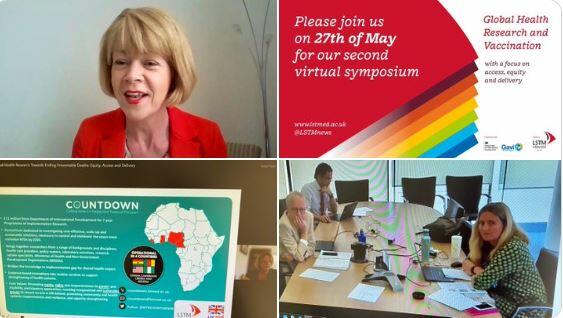
A joint initiative sponsored by the UK Department for International Development, Gavi and Liverpool School of Tropical Medicine (LSTM) brought together a host of international expert speakers to dialogue about vaccine and health systems science.
In the latest event speakers from government and academia shared the latest thinking on access, equity and delivery of health services and immunisation. Given the current global COVID-19 pandemic, many of their recommendations addressed how past research can help us ‘build back better’ in the future.
Panellist Dr Jeremiah Chakaya, (Respiratory Society of Kenya and IMPALA) provided an astute summary of some of the key themes of the symposium: equity and leaving no one behind, the importance of community engagement, and long-term multi-disciplinary and multisectoral partnerships and funding arrangements.
Equity and leaving no one behind
Issues of equity come into stark relief when we consider the need to develop, manufacture and distribute a vaccine for COVID-19 to all those who need it – the most vulnerable, marginalised and remote. It is a huge endeavour. Rt Hon Wendy Morton MP, Parliamentary Under-Secretary of State and Minister for European Neighbourhood and the Americas, emphasised that investment in evidence informed global health is more vital than ever and that unless we take a global approach to the pandemic it will forever be a threat.
The importance of community engagement
Dr Haja Wurie (COMAHS and ARISE Consortium) reminded us of the vital role of community health workers during and since the Ebola outbreak in Sierra Leone in forming a vital bridge between the health system and the community. She talked of how health communication mediated by community health workers was so much more effective than the words of outsiders as the community health workers were seen as the ‘sons and daughters of the soil’, they belonged and they understood. Supporting community health workers (financially and also in terms of their health and safety and psycho-social needs) remains a challenge despite the altered policy and government and their good intentions. But along with Traditional Leaders, these workers will be key to future epidemic responses as they reach people who are geographically and culturally inaccessible to the formal health workforce. They can inspire trust and have experience in contact tracing, safe burial and appropriate health communication messaging (for example about handwashing).
Drawing on the experiences of Liberia during the Ebola outbreak Dr Janice Cooper of the Carter Center explored how communities were provided with mental health and psycho-social support through community dialogues. These dialogues aimed to mend some of the fractures that had occurred related to issues like stigma and discrimination and lack of trust. Pointing to the current pandemic she stressed the need for a response with psycho-social support at its centre. Moving images from her presentation of the Minister of Health embracing survivors of Ebola Virus Disease visually demonstrated how leadership at the highest levels is needed to diffuse fear, heal societies and ensure inclusion and care for the most vulnerable.
Long term multi-disciplinary and multisectoral partnerships and funding
The work of the COUNTDOWN Consortium was explored by Dr Rachael Thomson. Their work on Neglected Tropical Diseases also pointed to the importance of local communities in shaping Mass Drug Administration programmes and other interventions so they met the needs of the most vulnerable, for example children out of school. This research also benefited by being shaped by diverse scientific disciplinary backgrounds so that social scientists, NTD experts, gender scholars and economists could come together to suggest whole of health systems solutions. Links with sectors beyond health – such as education were also important.
In the final presentation Professor Melita Gordon, University of Liverpool, reflected on typhoid vaccine trials and implementation in Malawi. This vaccine trial was delivered mainly through the education system pointing to the importance of a whole of government approach to outbreaks. She also stressed the need for long term donor/researcher relationships as this was one of the key factors that enabled vaccine scientists to draw on past learning and act swiftly to develop and roll out programmes. As with many of the presentations she drew our attention back to the need to consider equity. Treating the poorest, the most fragile, the most marginal is not only the right thing to do but is also the strategy that will have the most impact on poverty.
Looking to the future
On the 4 June 2020 the UK Government will be hosting a landmark conference where it is hoped that other governments and donors will pledge to Gavi to meet their financing needs for future years. This follows their recent commitment to Gavi of £330 million a year for the next five years.
After that LSTM will host a final virtual symposium on the topic of private sector partnership and accelerating the development of new tools. The date of the symposium is 17 June 2020, all are welcome.
A recording of the 2nd virtual symposium can be found below, answers to audience questions which could not be answered during the live stream are here and a recording and report of the first one can be found here.
Collated questions from the 2nd virtual symposium can be found here